- Home
- Peter Ackroyd
Wilkie Collins Page 3
Wilkie Collins Read online
Page 3
Compensations could be found. His mother sent him cake, which he described as “delectably luscious.” In winter he was able to slide on the frozen ponds of the vicinity. One boy swallowed spiders for a penny. Wilkie also reassured his mother that his eyes were better, which suggests something of the inflammation that would cause him agonies at a later date. It must have been a relief, however, to leave behind his schooldays at the age of sixteen. No more Latin. No more Greek. Yet what was to be done with him? William Collins considered the possibility of his son’s taking holy orders. “My father,” Wilkie wrote, “proposed sending me to the University of Oxford, with a view of my entering the Church.” On reflection, however, it was clear that he was wholly unsuited to the ministry. He was naturally averse to respectability in any of its forms. He was always ready to disparage the “clap-trap morality” of the nineteenth century. The student allowance, necessary for keeping up appearances, may also have been too large for William Collins’s pocket. Wilkie told his father that “I thought I should like to write books,” but this was considered to be a wayward youthful enthusiasm that would lead to a life of poverty in a garret. In the absence of a viable alternative, therefore, the seventeen-year-old was consigned to a career in commerce.
The health of William Collins had not improved since the maladies of Sorrento, and it was believed by his doctor that his rheumatism was exacerbated by the fact that the house in Avenue Road lay on damp clay soil. So in the summer of 1840 the family migrated to the drier region of Oxford Terrace, a little to the north of Hyde Park. It was from here that Wilkie Collins walked every morning, or took the omnibus, to the offices of Antrobus & Company at the west end of the Strand close to Trafalgar Square.
He was now apprentice to a firm of tea importers. Since Edmund Antrobus was a friend of William Collins, it is likely that he was granting the painter a favour by taking on his son as an unpaid apprentice rather than as a salaried clerk. In this way Wilkie would get “to know the business” and accustom himself to the methods of commerce. It was also a means of keeping him occupied. Idleness was a sin.
So Wilkie suffered on an office stool, where he copied invoices and bills of lading. In one of his novels, Hide and Seek, another young man enters the office of a tea broker and, after three weeks of employment, voices his complaint. “They all say it’s a good opening for me, and talk about the respectability of commercial pursuits. I don’t want to be respectable, and I hate commercial pursuits.” That may be deemed to be the authentic voice of Wilkie Collins. “Only fancy me going round tea-warehouses in filthy Jewish places like St. Mary-Axe, to take samples, with a blue bag to carry them about in; and a dirty junior clerk, who cleans his pen in his hair, to teach me how to fold up parcels!”
Wilkie may have expressed his displeasure to his father since, in the spring of 1842, William Collins wrote to one of his patrons, Sir Robert Peel, with a request that his son might be granted entry to the Civil Service. Peel was then the First Lord of the Treasury, in which department his son “might have the prospect, however distant, of rising to eminence.” Peel was discouraging. Wilkie remained with Antrobus & Company for a further four years. He seems to have done his work quickly and then to have devoted his time to scribbling poems, plays, stories, anything. He admitted later that he had produced vast quantities of nonsense, and yet it was the necessary preparation for the career he would eventually follow. There may have been times when he was frustrated and morose.
In the summer of 1842, however, William Collins took his son on a painting tour of Scotland. They travelled by sea to Edinburgh, where he visited the Old Town and climbed Arthur’s Seat; then they journeyed on by steamer to Wick, in the north of Scotland, before going on to Lerwick in the Shetlands. Collins had been asked to furnish illustrations for Sir Walter Scott’s The Pirate set in this wild and desolate landscape. Wilkie himself invoked it in later novels, with the moorland and the bog and the dripping white mist. On one occasion he and his father were lost on the moor, and were told to “leave it to the pownies.”
In his memoir of his father he recalls the “small dull glow of light lingering in the western hemisphere” and “the bright, pure northern twilight which streamed through their bedroom windows at midnight.” He describes “Mr. Collins, with one knee on the ground, steadying himself against the wind; his companion [Wilkie Collins] holding a tattered umbrella over him, to keep the rain off his sketch book.” In the memoir, also, he interprets his father’s painting in vibrant terms, and these short prose pieces convey Wilkie’s interest in painterly composition. Of one landscape he wrote that “the sky is tinged by a mild, dawning light, which arises over a bank of misty vapour, and touches the wild, sharp edges of a large cloud.”
He possessed a painter’s eye, and learned much from his intimacy with his father’s work. He learned how in narrative terms to set off mass and detail on his canvas, and how to fix the proportions of light and shade or comedy and pathos. On the preparation for his novels he told one correspondent that “all this is done, as my father used to paint his skies in his famous sea-pieces, at one heat.” When he explained that William Collins fashioned an art which “connected the figures with the landscape, making each of equal importance” he was also describing his own practice. Thus, in The Moonstone, “I saw the raging sea, and the rollers tumbling in on the sand-bank, and the driven rain sweeping over the waters like a flying garment, and the yellow wilderness of the beach with one solitary black figure standing on it—the figure of Sergeant Cuff.” His novels resemble a series of pictures rather than a sequence of scenes. Yet the innate sympathy between character and landscape, in all of his work, means that the pictures are animated by dramatic life. In small as well as large matters the metaphors of the painter’s trade came naturally to him. On completing The Woman in White he wrote to a friend that “I have done! (except for my varnishing days in respect of proof sheets)”; a “varnishing day” was the day before the exhibition at the Royal Academy when the artists could apply their finishing touches.
Then, after the wilderness of the Shetlands, he and his father returned to the desolation of London. The family moved once more; they travelled only a short distance and decamped round the corner to Devonport Street. This house had the great advantage of containing a room that could be employed as a studio, the first William Collins had ever possessed. Wilkie described just such a studio in one of his novels, with its pots and brushes, scraping knives, chalks and pencils, rags smeared with paint and oil. He also referred to a very special trick of his father, who had painted a quill pen and sable brush upon the floor; they were so exactly reproduced that visitors would stoop to pick them up, at which point William Collins would invariably laugh at his successful practical joke.
Wilkie returned to his office stool at Antrobus & Company, but now there was a significant difference in his life. He was about to become an apprentice in quite another sense. In 1843, at the age of nineteen, he became a published writer.
CHAPTER FOUR
First Light
The offices of Edmund Antrobus were situated in one of the centres of the London publishing world. Chapman & Hall, which had already published The Pickwick Papers and Nicholas Nickleby, was close by; the offices of Punch, the Illuminated Magazine and the Illustrated London News were in the vicinity. Wilkie may already have started writing reviews but, since they were anonymous, any such pieces have long ago been lost.
His first work is a slight piece of rodomontade entitled “Volpurno”; its existence is only known because it was reprinted in a New York journal, and its first English publication is not recorded. It is a Poe-like story, set in Venice, of doomed love between a beautiful Englishwoman and a demented student of astronomy. It is of no real interest, except as an indication of Collins’s tendency towards sentimentality and Gothic melodrama. In the summer of 1843 he published one of his first sketches, “The Last Stage Coachman,” in the Illuminated Magazine. The dominant influence here is that of Dickens rather than Poe, and it is
a lament on the replacement of the stagecoach by the railway train. “We wasn’t full but we wasn’t empty,” the eponymous coachman says, “we wos game to the last!”
This was written at the peak of what became known as “railway mania,” and is an indication that Wilkie began his writing career at a time when social and economic change was all around him. The look of the coachman, at an arriving train, was “the concentrated essence of the fierce and deadly enmity of all the stage coachmen of England to steam conveyance.” He was looking at the network of rails that now covered much of England with 5,000 miles of line, at the factories growing larger and more efficient, at the rapid development of the cities and the industrial towns, at the growth of the suburbs, at the increase of population, at the radical changes in agricultural practice, at what Charles Dickens describes in Dombey and Son as “competition, competition—new invention, new invention—alteration, alteration.”
He must have showed his first published pieces with some pride to his father, who in the following year submitted them to the President of Corpus Christi for his literary opinion. He reported to his wife that “Dr. Norris…thinks he ought to do great things.” Collins himself was sufficiently impressed to confide to his diary that “I think it quite possible that my dear son, William Wilkie Collins, may be tempted, should it please God to spare his life beyond that of his father, to furnish the world with a memoir of my life.”
Wilkie was willing enough to throw himself into any literary enterprise, and in 1843 began work on his first novel. Ioláni was set in Tahiti where “my youthful imagination,” as he wrote later, “ran riot among the noble savages.” For the nineteen-year-old, Tahiti was also delectable because of its association with free love. He was already a fantasist. Yet he did his homework, too, and consulted the four volumes of William Ellis’s Polynesian Researches as well as Basil Hall’s Fragments of Voyages and Travels; throughout his life he was inspired by documentary material, and in the process he breathed upon facts and kindled them into life.
In the summer of 1844 he broke off his labours, both in the study and in the office, to travel to Paris with Charles Ward. Ward was courting Wilkie’s cousin and, although he was ten years older than Collins, they made good travelling companions. In later life, having joined Coutts & Company, he became the writer’s financial adviser. Yet now they were young, and they were in Paris. They were abroad for five weeks, suggesting that the terms of Wilkie’s apprenticeship were not strict ones. They intended to follow the early stages of the route of Yorick in Laurence Sterne’s A Sentimental Journey, but their true destination was the capital of dissipation. Just before leaving Collins had also purchased the works of François Rabelais, hitting the right bawdy and sybaritic note before a journey to the Continent.
His letters from Paris to his mother record his visits to the gardens, the theatres, the cafés and the opera houses; there was no end of eating and drinking, confirming that Wilkie was already an aficionado of French food which he extolled all his life. He also wanted to know whether Antrobus would extend his leave of absence. He signed his letters “Wilkie Collins,” rather than “Willie” or “Willy,” as a mark of the independence he now felt to be his due. His father was not impressed by his Parisian high spirits. “I do not like his flippant companion,” he wrote, “they seem to think of nothing but doing absurd things.”
On his return Wilkie completed his composition of Ioláni. The plot, like most of Collins’s plots, is perhaps too complex properly to summarise. Ioláni is a high priest, as evil as he is cruel, who fathers a child by the sentimental heroine Idía; he decides to sacrifice the child to his gods, in the ancient practice among the Tahitians of infanticide, but Idía flees into the verdant wilderness with a female companion named Aimáta. The machinations of the adventure included internecine warfare, wild men, and sorcery. The narrative is notable, however, for Collins’s first depiction of abusive male power against women. It would become one of his principal themes. It is characteristic, too, that the two heroines are vigorous and spirited enough to fight back. Collins’s later fiction is filled with independent females who defy the nineteenth-century stereotypes of femininity. Ioláni is an expressive, if languorous, fiction in the form of an intensely imagined reverie. Collins is an adult in craft, and an adolescent in sentiment. Murder and battle, funeral processions and wedding celebrations, are all seen in terms of theatrical spectacle; the chapters succeed one another in beautiful monotony, like waves crashing on the Tahitian shore.
He submitted the manuscript to the firm of Longman, which intimated that it might be willing to publish if Collins’s father covered the costs of the enterprise; he then sent it to Chapman & Hall, who eventually declined to take it on. Other English publishers seem to have followed suit, and Collins put the pages away in a drawer. “For the moment,” he wrote, “I was a little discouraged. But I got over it and began another novel.” He now believed his future to be that of a writer.
He was also a young man about town. In the company of Charles Ward, and others, he was now able to explore the delights and dangers of London. He was still an apprentice in an office, of course, and no doubt followed the familiar life of the clerk at large in the streets of the city. It was a favourite theme for the essayists of the period. In Hide and Seek, while narrating the adventures of a young man in the tea trade, Collins dwells on the cheap delights of the town suffused “with glitter and gas”; the chop-houses, the gin shops, the cookshops, the burlesque shows, all competed for attention. In the same novel he describes the poorer quarters where “ballad-bellowing and organ-grinding and voices of costermongers” never cease their counterpoint to the general roar of London. Elsewhere Collins describes the street markets of the poor, with a detail that can only come from direct observation. Here were “fish and vegetables; pottery and writing-paper; looking glasses, saucepans and coloured prints.” A vagabond sells apples from a donkey-cart, calling out, “Who says the poor ain’t looked after?” A blind man on the corner is selling boot laces and singing a psalm; an old soldier plays “God Save the Queen” on a tin whistle, and a beggar wears a placard addressed to “The Charitable Public.”
The cheap theatres were always an attraction. The performances, melodrama or pantomime according to taste, often did not finish until midnight. The air was foul, but the drink was plentiful. One penny was the price for admission; they were known as “penny gaffs.” Aspiring actors paid for the privilege of taking on roles in Gothic horror, corrupted Shakespeare, sentimental comedy and domestic farce. It was the principal entertainment of the period before the advent of the music hall. The pit was filled with wooden backless benches, the audience as rough and as coarse as you would expect in the city. Dancing and singing often interrupted the proceedings on the stage with the women and children, according to Henry Mayhew, “bringing an overpowering stench with them.” This is the other side of Victorian propriety and respectability, a contrast that Collins himself often noted.
Some night haunts opened when the theatres closed; they claimed to be places of “musical entertainment,” in which amateurs would sing to the accompaniment of a piano or a banjo. But essentially they were places of drink and dissipation. They reeked of brandy, bad breath and stale tobacco. The “comic songs” were smutty and salacious They were also the venue of the sisters of the streets in whom Wilkie had a profound interest. “Are you good-natured, sir?” a prostitute remarks to a likely customer in one of his novels; it is a phrase that has the ring of authenticity. Wilkie often adverted to the plight of these women. As one contemporary wrote, “hospitals do not as a rule admit them, dispensaries cannot cure them; even soup-kitchens for the sick will not help to feed them.”
When Charles Collins was admitted to the Royal Academy Schools, a further opportunity for more respectable celebration presented itself. Wilkie Collins drank so much on this occasion that he quoted the phrase from the Bible, “my belly is as wine.” We may surmise that in these years, the young Wilkie was frequently inebriated.
When he and his younger brother returned home at four in the morning, Charles Collins heard the cock crow and whispered that people out of doors that late “were not in a fit state to die.” The younger Collins was in truth a diffident and nervous young man. He had an absolute horror of being left alone in the dark and his friend, Millais, bestowed on him the nickname of “Old Timidity.”
Collins’s father had never recovered his health, and from this time forward began sinking towards death. By the spring of 1844 he had contracted a persistent and wearing cough that left him weaker and weaker; after one particular bout of coughing, on attending a dinner party, he remarked that “I have dined out for the last time.” He set out with his wife for the drier air of Anglesey, leaving the two boys at home. But the expedition did no permanent good; by the autumn of the year he was spitting blood. His nerves were very bad. The Collins household could not have been a happy one.
In the autumn of 1845, a few months after completing Ioláni, Wilkie decided to make the journey to Paris alone. He was now twenty-one and no doubt eager to claim and to assert his independence. He told his mother that on his crossing to Rouen, “I made acquaintance with every soul in the ship, from a good hearted negro who told me he was a student in philosophy! To a man with a blood-spotted nose, who knew all the works, of all the artists, ancient and modern, all over the world.” Once installed in the Hôtel de Tuileries, on the rue de Rivoli, he began his life of unaccustomed freedom. He ate oysters and cutlets for breakfast, smoked cigars (a habit his father deplored) and drank innumerable cups of coffee. He was as always delighted by the more vivid scenes of ordinary life. The waiter in the hotel made strange cackling sounds of which “omeberellaw” was one; it was a wet morning. Wilkie screamed with laughter at the noise he was making, and so did the waiter.

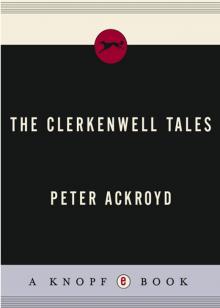 The Clerkenwell Tales
The Clerkenwell Tales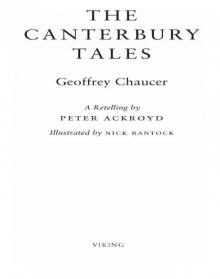 The Canterbury Tales
The Canterbury Tales J. M. W. Turner
J. M. W. Turner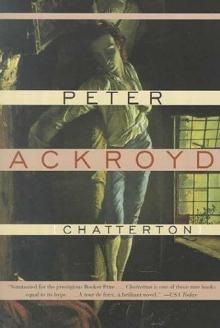 Chatterton
Chatterton The Canterbury Tales – A Retelling
The Canterbury Tales – A Retelling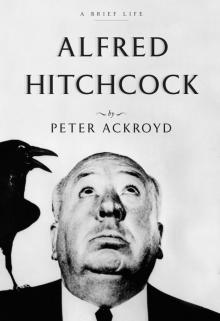 Alfred Hitchcock
Alfred Hitchcock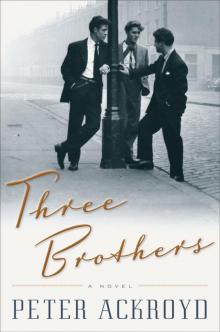 Three Brothers
Three Brothers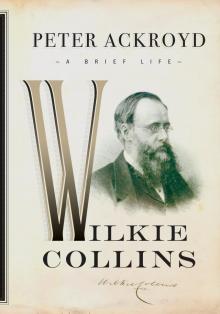 Wilkie Collins
Wilkie Collins Venice
Venice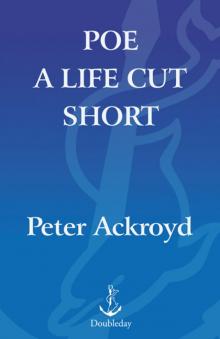 Poe
Poe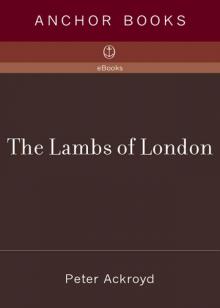 The Lambs of London
The Lambs of London London
London Queer City
Queer City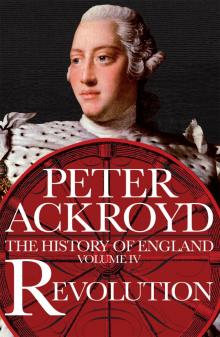 Revolution, a History of England, Volume 4
Revolution, a History of England, Volume 4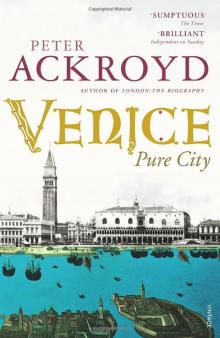 Venice: Pure City
Venice: Pure City Foundation
Foundation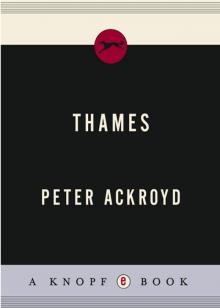 Thames
Thames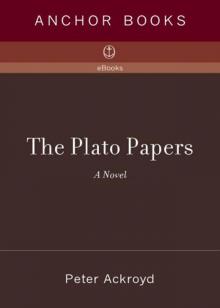 The Plato Papers
The Plato Papers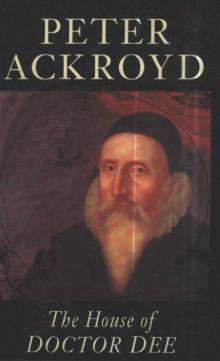 The house of Doctor Dee
The house of Doctor Dee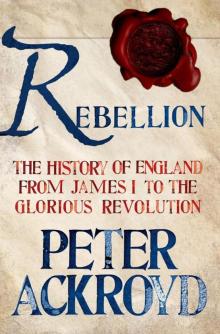 Rebellion: The History of England from James I to the Glorious Revolution
Rebellion: The History of England from James I to the Glorious Revolution Albion: The Origins of the English Imagination
Albion: The Origins of the English Imagination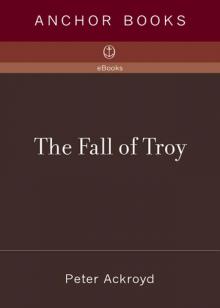 The Fall of Troy
The Fall of Troy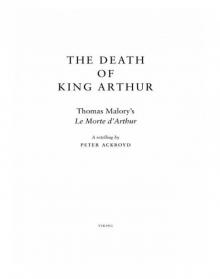 The Death of King Arthur
The Death of King Arthur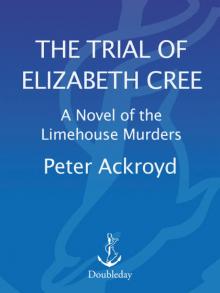 The Trial of Elizabeth Cree
The Trial of Elizabeth Cree London: The Biography
London: The Biography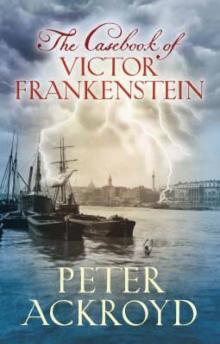 The Casebook of Victor Frankenstein
The Casebook of Victor Frankenstein Hawksmoor
Hawksmoor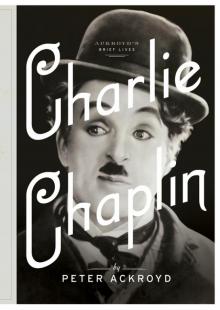 Charlie Chaplin
Charlie Chaplin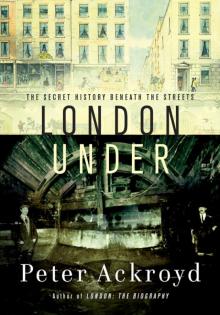 London Under
London Under